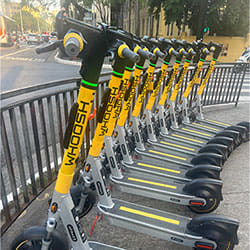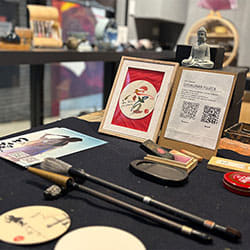They put up novel coronavirus precautions at the apartment where I live and restricted the number of people at the gym. Right next to that notice was a piece of paper with a resident’s name, mobile number, and this message: "If you're elderly and worried about going shopping, I will do the shopping for you. Please feel free to contact me." This considerateness is typical of Brazilians and impresses me because it means thinking about what’s going on around you before you act.
In Brazil, more people use WhatsApp than Line, and in the first week it was nothing but information about the novel coronavirus, and on top of that, in the news too it was nothing but the novel coronavirus, which made me feel a little down. It became my job to think about what to eat three times a day, and I tried making all sorts of new dishes. I uploaded the dishes I succeeded at to a WhatsApp group, we complimented each other's dishes, and I got ideas. The second week, I just ate.

The number of cars around my apartment has decreased a lot, and now you see lots of patrol cars on the beat. The reason is that there had been an increase in mobile phone and wallet thefts because the streets are so quiet. When I go to the nearby bakery there are almost no people walking around, which makes me feel a little scared.

At the start of the third week, the numbers of people infected and killed by the novel coronavirus had increased, and I realized that this situation was going to carry on for a long time. My friends started making their own cloth masks because they weren’t available to buy. People uploaded all sorts of methods for sewing them to YouTube. The masks then became available online, on Instagram, and even at the bakery counter, for 10 Reals (about US$2) on average. Then there came a whole lot of information about all kinds of shops doing deliveries. I really was worried about people touching the fruit and vegetables at the supermarket. The supermarket I go to has alcohol gel near the fruit and vegetables. You can use it any number of times and it disinfects your hands, so it makes me feel safe. Still, when I get back home after shopping, first, I take off my clothes and take a shower. I also wash my hair. Then I take out the shopping from the bags and disinfect all the items. I wash the washable things with soap, I put disinfectant on the fruits and so on, and then I dry them. I also wash the bags I have taken to the supermarket. Frankly, it's harder once I’m back home compared to doing the shopping at the supermarket.

I got tired of cooking at home, so on the weekends I started ordering sweets from the cake shop as well as pizza and set meals for dinner. Lately I’ve also been worried about lack of exercise, so I looked on YouTube for stretches and exercises and have started up with an instructor. Getting physically active really makes me feel better!
At the start of the fourth week, the governor of São Paulo state extended self-isolation to May 10. On April 20, the mayor of São Paulo city recommended wearing a homemade mask if you have to go out.
I’m starting to do things I don’t usually get to do because of lack of time, like tidying up the shelves, doing language studying, and practicing piano. Recently, however, there have been a lot more people at the supermarket than before, perhaps because more people are getting tired of being at home. You can also hear the voices of children playing in the apartment’s open space. There are also people agitating for action and people asking questions like, whether the governor is doing the right thing and when they can get back to work. But in my circle of friends and acquaintances there are stories of people dying from coronavirus. The reality at the moment is that things haven’t gotten back to normal yet.
I had a relative who died of an illness the other day. It wasn't coronavirus, but we couldn't hold a normal funeral because we have to avoid gatherings. We held a 30-minute farewell ceremony with only about 10 of the people closest to my relative attending. Not being able to hold a normal funeral for someone who had hung on for over 80 years was something I felt keenly and brought home to me just how many people this pandemic is giving grief to.
On April 26, at the end of the fifth week in Brazil, there were 4,205 deaths and 61,888 confirmed cases.






























































